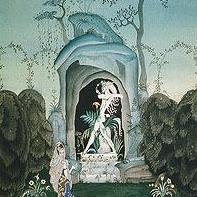-
Content Count
19 -
Joined
-
Last visited
Reputation Activity
-
 inertia got a reaction from SHOKI in [Lyrics] Versailles - Lineage -Bara no Matsuei-
inertia got a reaction from SHOKI in [Lyrics] Versailles - Lineage -Bara no Matsuei-
I scanned the lyrics and put them on my Tumblr. I scanned them at 300 dpi so you can see things that are normally too small to read, like the ruby for 音楽/アナタ in La Musique. (will edit that now)
http://romancekakumei.tumblr.com/post/157973409154/lineage-lyrics-scans
-
 inertia got a reaction from SHOKI in [Lyrics] Versailles - Lineage -Bara no Matsuei-
inertia got a reaction from SHOKI in [Lyrics] Versailles - Lineage -Bara no Matsuei-
La Musique
かつてそれは貴族達のために招かれ
宴の度 宮廷に響いた
美しすぎるメロディー
勇気や希望 時に涙を与えて
彼らの心を操る
芸術という爵位を捨て 民衆にさえ寄り添う
そんな音楽を いま守りたい
私たちを出会わせてくれた感謝を
旋律で貫いた貴族のセレネイド
残酷な時代だから抱きしめたい
夢を孤独を愛の言葉を
そう 載せて音楽は (アナタ is written above 音楽)
Ah どんな時代でも奏で続けている
Ah どんな時代でも愛を奏でている
人々の想いを願いを背負って
旋律で貫いた貴族のセレネイド
残酷な時代だから抱きしめたい
夢を孤独を愛の言葉を
そう 載せて音楽は (アナタ is written above 音楽)
愛を奏でている
私たちと共に
残酷な時代だから激しく燃えて
旋律で貫いた愛はコンチェルト
重ね交わる二人のように
Ah 人と音楽は (アナタ is written above 音楽)
Shadows Fang
あなたと同じ時代に生まれて
肩を並べ風を受ける
誰かが出す少しの疑問も
何一つも逃がさない
I Believe. We have a Sympathy.
宿命に飲み込まれて
傷が共鳴してゆく
どんなに独りで探してみても
出せない答えがここにはあるから
さぁ避けていた群れに戻ろう
大きな獲物を仕留めるために
孤独を好んで群れをさけて
誰も知らない場所にいた
あなたともし出会ってなければ
いまここにはいない
I Believe. You are my Destiny.
運命を描き出して
遠吠え 共鳴してゆく
どんなに独りで探してみても
出せない答えがここにはあるから
さぁ避けていた群れに戻ろう
大きな獲物を仕留めるため
Ah 強い風を 共に受け止めて
私たちはいまここに並んだ
孤独な狼
Inheritance
尊き人
あなたの中から叫ぶ声
未来の私へ
聞こえるでしょう?
幼い言葉が
感じるでしょう?
涙の温度
愛が分からない
羽ばたいた命を揺らす博愛の風
人は誰もが皆 望まれ生まれて
「特別な存在だよ」と言われることが
何より重く 鉛の翼になった
無償の愛の理由 分からないまま
大きすぎて怖かった
受け止め切れずに
確信が欲しい
羽ばたいた命を揺らす博愛の風
人は誰もが皆 望まれ生まれて
「特別な存在だから側にいてよ」と
愛する人と巡り会えたならば
あなたがくれた尊き愛
分かるその時まで
A Day Without You
街行く人波の中 すれ違う君に
香りで気づいて すぐに振り返る
他人の背中の奥 見失った後に
冷たい手のひらで不意の目隠し
Ah このままずっと時間が止まってしまえばいい
そんな胸の高鳴りを感じた
いつしか二人は愛というものに慣れて
ありのままの自分に甘えすぎた
そんな日々の中 気付けなかった本音を
涙をこらえながら君は言った
「ねぇ … 気持ちがわからない」
君の言葉が分からない
そばにいるから だから見えなくなる
君を失う事なんて考えられない
答えはその一つなのに
抱きしめることさえも出来なくて苦しめてた
「聞きたかった」
「でも聞くことなんて出来ず」
「ずっと 変わらないでいる気持ちを伝えて欲しくて」
だけど側にいればいるほど見えなくなる想い
当たり前の日々の中で苦しめ続けた
君を失う事なんて考えられない
答えはその一つなのに
抱きしめることさえも出来なくて苦しめてた
Lineage
天井画を見上げ 鏡の間の中
並んで歩く自分にも気づかない
過去が見つめてくる 未来が目を逸らす
終わりのない駆け引き 繰り返して
絡まるように刻んで
数え切れないほど 自分と戦い
歩き続ける戦士は美しい
磨き上げたものは 剣ではなくて
曲がることなきその胸の信念
Because We have a Lineage
鏡に映る自分と (We have a Lineage)
見つめ合ってキスをした (We have a Lineage)
殺すのか?愛するのか? (We have a Lineage)
鏡の中に問いかけ
決断を迫る -Judgement-
信じられるものは
私だけ… 私だけ… あなただけ…
Ah… 信じさせて
Because We have a Lineage
鏡に映る自分と (We have a Lineage)
見つめ合ってキスをした (We have a Lineage)
殺すのか?愛するのか? (We have a Lineage)
隣にいるあなたの その瞳 映る私を いつまでも愛して
(We have a Lineage)
[The background image on the lyrics sheet for this song appears to be the Hall of Mirrors in Versailles]
Marionette
この誰もいない部屋で君が
ずっと一人で遊んでいたのならば
このテーブルに残された
小さな足跡は誰のものでしょう?
月の灯りが差し込み見えた
部屋に張り巡らされた秘密の糸
埃をかぶった針も
命を持たない彼らの体も
動き出した午前0時
僕の手を引き
見上げては踊ろうよと誘う Marionette
(Doll Doll Play Doll Doll Play Doll Play)
真夜中の秘密 be dying to dance
真夜中の秘密 be dying to play
君が仕掛けた糸なら
踊らされてもいい この夜に
夢の中 午前0時僕に微笑み
見上げては踊ろうよと誘う Marionette
Let’s Play
(Doll Doll Play Doll Doll Play Doll Play)
真夜中の秘密 be dying to dance
真夜中の秘密 be dying to play
君が仕掛けて罠なら
踊らされてもいい この夜に
I will heal loneliness
So every night
[In the first verse I hear テーブルの上に instead of このテーブルに, but this is what is written]
-
 inertia got a reaction from ruki11 in [Lyrics] Versailles - Lineage -Bara no Matsuei-
inertia got a reaction from ruki11 in [Lyrics] Versailles - Lineage -Bara no Matsuei-
I scanned the lyrics and put them on my Tumblr. I scanned them at 300 dpi so you can see things that are normally too small to read, like the ruby for 音楽/アナタ in La Musique. (will edit that now)
http://romancekakumei.tumblr.com/post/157973409154/lineage-lyrics-scans
-
 inertia reacted to ShanethVarosa in [Lyrics] Versailles - Lineage -Bara no Matsuei-
inertia reacted to ShanethVarosa in [Lyrics] Versailles - Lineage -Bara no Matsuei-
@inertiayou are god to me. i would die for you. or kill others.
Translations coming soon.
-
 inertia got a reaction from Ururu in [Lyrics] Versailles - Lineage -Bara no Matsuei-
inertia got a reaction from Ururu in [Lyrics] Versailles - Lineage -Bara no Matsuei-
La Musique
かつてそれは貴族達のために招かれ
宴の度 宮廷に響いた
美しすぎるメロディー
勇気や希望 時に涙を与えて
彼らの心を操る
芸術という爵位を捨て 民衆にさえ寄り添う
そんな音楽を いま守りたい
私たちを出会わせてくれた感謝を
旋律で貫いた貴族のセレネイド
残酷な時代だから抱きしめたい
夢を孤独を愛の言葉を
そう 載せて音楽は (アナタ is written above 音楽)
Ah どんな時代でも奏で続けている
Ah どんな時代でも愛を奏でている
人々の想いを願いを背負って
旋律で貫いた貴族のセレネイド
残酷な時代だから抱きしめたい
夢を孤独を愛の言葉を
そう 載せて音楽は (アナタ is written above 音楽)
愛を奏でている
私たちと共に
残酷な時代だから激しく燃えて
旋律で貫いた愛はコンチェルト
重ね交わる二人のように
Ah 人と音楽は (アナタ is written above 音楽)
Shadows Fang
あなたと同じ時代に生まれて
肩を並べ風を受ける
誰かが出す少しの疑問も
何一つも逃がさない
I Believe. We have a Sympathy.
宿命に飲み込まれて
傷が共鳴してゆく
どんなに独りで探してみても
出せない答えがここにはあるから
さぁ避けていた群れに戻ろう
大きな獲物を仕留めるために
孤独を好んで群れをさけて
誰も知らない場所にいた
あなたともし出会ってなければ
いまここにはいない
I Believe. You are my Destiny.
運命を描き出して
遠吠え 共鳴してゆく
どんなに独りで探してみても
出せない答えがここにはあるから
さぁ避けていた群れに戻ろう
大きな獲物を仕留めるため
Ah 強い風を 共に受け止めて
私たちはいまここに並んだ
孤独な狼
Inheritance
尊き人
あなたの中から叫ぶ声
未来の私へ
聞こえるでしょう?
幼い言葉が
感じるでしょう?
涙の温度
愛が分からない
羽ばたいた命を揺らす博愛の風
人は誰もが皆 望まれ生まれて
「特別な存在だよ」と言われることが
何より重く 鉛の翼になった
無償の愛の理由 分からないまま
大きすぎて怖かった
受け止め切れずに
確信が欲しい
羽ばたいた命を揺らす博愛の風
人は誰もが皆 望まれ生まれて
「特別な存在だから側にいてよ」と
愛する人と巡り会えたならば
あなたがくれた尊き愛
分かるその時まで
A Day Without You
街行く人波の中 すれ違う君に
香りで気づいて すぐに振り返る
他人の背中の奥 見失った後に
冷たい手のひらで不意の目隠し
Ah このままずっと時間が止まってしまえばいい
そんな胸の高鳴りを感じた
いつしか二人は愛というものに慣れて
ありのままの自分に甘えすぎた
そんな日々の中 気付けなかった本音を
涙をこらえながら君は言った
「ねぇ … 気持ちがわからない」
君の言葉が分からない
そばにいるから だから見えなくなる
君を失う事なんて考えられない
答えはその一つなのに
抱きしめることさえも出来なくて苦しめてた
「聞きたかった」
「でも聞くことなんて出来ず」
「ずっと 変わらないでいる気持ちを伝えて欲しくて」
だけど側にいればいるほど見えなくなる想い
当たり前の日々の中で苦しめ続けた
君を失う事なんて考えられない
答えはその一つなのに
抱きしめることさえも出来なくて苦しめてた
Lineage
天井画を見上げ 鏡の間の中
並んで歩く自分にも気づかない
過去が見つめてくる 未来が目を逸らす
終わりのない駆け引き 繰り返して
絡まるように刻んで
数え切れないほど 自分と戦い
歩き続ける戦士は美しい
磨き上げたものは 剣ではなくて
曲がることなきその胸の信念
Because We have a Lineage
鏡に映る自分と (We have a Lineage)
見つめ合ってキスをした (We have a Lineage)
殺すのか?愛するのか? (We have a Lineage)
鏡の中に問いかけ
決断を迫る -Judgement-
信じられるものは
私だけ… 私だけ… あなただけ…
Ah… 信じさせて
Because We have a Lineage
鏡に映る自分と (We have a Lineage)
見つめ合ってキスをした (We have a Lineage)
殺すのか?愛するのか? (We have a Lineage)
隣にいるあなたの その瞳 映る私を いつまでも愛して
(We have a Lineage)
[The background image on the lyrics sheet for this song appears to be the Hall of Mirrors in Versailles]
Marionette
この誰もいない部屋で君が
ずっと一人で遊んでいたのならば
このテーブルに残された
小さな足跡は誰のものでしょう?
月の灯りが差し込み見えた
部屋に張り巡らされた秘密の糸
埃をかぶった針も
命を持たない彼らの体も
動き出した午前0時
僕の手を引き
見上げては踊ろうよと誘う Marionette
(Doll Doll Play Doll Doll Play Doll Play)
真夜中の秘密 be dying to dance
真夜中の秘密 be dying to play
君が仕掛けた糸なら
踊らされてもいい この夜に
夢の中 午前0時僕に微笑み
見上げては踊ろうよと誘う Marionette
Let’s Play
(Doll Doll Play Doll Doll Play Doll Play)
真夜中の秘密 be dying to dance
真夜中の秘密 be dying to play
君が仕掛けて罠なら
踊らされてもいい この夜に
I will heal loneliness
So every night
[In the first verse I hear テーブルの上に instead of このテーブルに, but this is what is written]
-
 inertia reacted to hiroki in [HELP] Any tips on translating?
inertia reacted to hiroki in [HELP] Any tips on translating?
Komorebi already explained the importance of fidelity in translation but i'll just add this: even if you're not "putting it forward as though it was something the artist actually said" a translation by definition finds an equivalent or at least a very good approximation to the original. A translation isn't simply a "review" of the original or whatever happens to be the translator's opinions on it. So it's my belief that every single translator whether you're doing for fun or professionally should have the basic commitment to convey the meaning of the original. As for what you're saying about interpretations: of course it's valid, but ideally a translator would strive to uncouple his/her interpretation of the text from the meaning of the text, so as to allow for readers to make their own interpretation from a translation that's as close to the source text as possible.
-
 inertia reacted to hiroki in [HELP] Any tips on translating?
inertia reacted to hiroki in [HELP] Any tips on translating?
(Edit: I realized after typing that my post is pretty long... sorry for that.)
There are a lot of reasons why translation is difficult, and especially so for languages that are not genealogically affiliated. If you ask me i think it's inevitable that at some point you're going to feel dejected that you've "butchered" the lyrics of a song you love, but hopefully I can show you that at least a part of that feeling stems from the fact that by and large Japanese doesn't translate very well into English at all, which isn't your fault (although of course, even though there's no perfect translation, there are translations that are blatantly incorrect).
In general, here are some challenges confronting anyone attempting to translate:
1) You need to ensure not only a complete correspondence of just the denotative meaning of the word (possibly multiple), but also its connotations, nuances, implications, cultural 'flavor' that you need to drag from one language to another. Cultural expressions like 宜しくお願いします have to be translated variously according to the context but even so it's not exactly the same. Some words like 何番目 have no English equivalent.
2) The etymology of the word that gives rise to its "internal" meaning, as well as its residual "meaning" that has accrued through its multiple usages in history (we call this the "trace" of a word). So for instance if you come across the word "individual" in 16th-century Renaissance poems, it actually refers to "that which is indivisible from the community/society" instead of what it means today ("that which stands apart from the society"). Attempting to translate the word into Japanese as 個人 compromises linguistic complexity because as a Sino-Japanese concept the word 個人 does not retain the same linguistic history of what "individual" means in English. This is kind of a nightmare when you're dealing with non-contemporary works.
3) The "metonymic" aspect of a word and how it functions in a sentence. What this means is that for every language, one word relates to the other words in a sentence in completely different ways, and this presents a serious impediment for translation because sometimes a language's syntax simply don't allow you to word things in a certain way. A classic example would be the perennial problem English translators of Franz Kafka encounter thanks to the author's extensive use of syntax and linguistic structures exclusive to the German language. In the context of Japanese, I recall the phrase "君を信じた僕を信じて" from BLESSCODE's Imperial City, which is cumbersome to translate into English because the pronoun "I" in English cannot be modified as by a phrasal verb like in Japanese. It's not impossible; but the feel is significantly different.
4) The "metaphoric" aspect of a word, i.e. how it triggers other words and concepts by association. A lot of this is cultural ("rose" for us signifies "love", which may not be the case for a different linguistic community) - so even if you translate the word-image correctly, you're losing what's arguably the more important dimension of the word if it's operating figuratively. If you think that's already hard, in Japanese you'll find idiomatic expressions (四字熟語), cultural idiosyncracies (various kinds of 慣用語), and notorious onomatopoeia (擬態語 and 擬音語) that abound not just in lyrics but also in day-to-day conversations.
5) And finally there's everything else which affects how a word is perceived by a reader/listener that linguists can't exactly put their finger on... so they happily call all of that 'context'.
As mentioned above, lyrics are one of the most difficult things to translate and there are reasons for this. I'm not a professional translator, although I'm required to translate academic essays by Japanese writers as part of my job. For my purpose I assume that there's a message the writer wants to convey (in good faith) which I focus on delivering. Effectively that means points 2~5 above are relatively less important when I'm doing my translations. However the converse is true in the case of lyrics: because for lyrics you aren't translating a single "meaning" but a field of potential meanings that a reader can possibly rope off from the original lyrics. So 2~5 become as important (if not more important) as the denotative meaning of the words in a song. Obviously mapping that field 100% is an impossible task, so it's completely natural to feel like as a translator you're already intruding and helping the eventual reader of your translated lyrics make interpretations in advance.
One last point I forgot to mention: Japanese has 3 different scripts while English has 1. As a result there's invariably some level of homogenization that takes place when Japanese is translated into English. This is less of an issue in day-to-day usage of the language since the division of labor between the three scripts is pretty straightforward... but not in lyrics. I'll give you an example. I was just talking to my friend about the solo project of Ryutaro (Plastic Tree vocalist), whose debut release is called "デも". As you know でも is "but" and デモ is like "demo(nstration) cd". If you dig deeper into the "metaphoric" level, you'll realize that でも can be a sort of protest, a breaking off from the original (it's his solo project anyway), and so on. and デモ naturally signifies a "first" and a fresh beginning. In this case splitting his title into 2 different scripts has a kind of mutually enhancing effect (in other places, like in DIV lyrics, you find that they create a tension). So you really have to make a choice here when you translate; alternatively you can transliterate it as "Demo" which would convey none of all of that unless you append a few paragraphs of footnotes.
tl;dr: Translation is difficult. Borrowing the words of John Ciardi (eminent translator of Dante's Divine Comedy): the translator strives not for success but "the best possible failure."
-
 inertia reacted to Komorebi in [HELP] Any tips on translating?
inertia reacted to Komorebi in [HELP] Any tips on translating?
I honestly give a fuck.
It is true many vocalists don't have a meaning in mind when writing lyrics, Naru from Diealo even said he wrote about popular relateable subjects like lost love and despair, even if he didn't feel it, because he knew fans would like it and it would sell.
OK, so Hiroki already said most of what I wanted to say and already explained different meanings and nuances of a word..
While translating songs could be a good excersise to practise your japanese, I would advice to always keep working on your Japanese and improve your level as much as possible.
Translating from ANY language is hard, not only from Japanese, because language and culture are so closely intertwined they influence each other and it will be impossible to not find words that are deeply rooted in or influenced by culture.
I will have to say nothing is truly untranslateable, and the reason many think certain words have "no translation" it's because the do not posess and exact equivalent in the target language, but it doesn't mean the concept cannot be explained. And there is where you'll have to get creative and see how you can convey the ideas better in English.
Another important tip is to NEVER translate word by word. In any language. Each language has it's own gramatical rules and translating word by word will end terminate in odd and gramatically incorrect sentenses in English.
Make sure your final product makes sense in English. I encountered not long ago a girl that translated Matenrou Opera's blog entries and her posts made no sense in English. Subject wasn't there half of the time and connectors were missing everywhere. When I pointed it out to her she said "I wanted to preserve the particularities of Japanese language". Please, PLEASE don't do that. Translation means taking the message from Language A and conveying it as best as possible into Language B in a way so that the core content of the message isn't lost AND it makes perfect sense and it's perfectly understandeable in Language B. Not a weird hybrid of both.
I also cannot stress enough the importance of context, which is also why word-by-word translation is NEVER a good idea. The longest part of a translation is always the correction. You can never go through the translated text too many times. There will often be that sensence that made sense when you translated it but doesn't anymore after reading it three times, or the words and connectors that suddenly don't fit. It's ok if you have to correct it twenty seven times, professionals do to and that's what makes a good translation good, not the initial perfection but the work put into it to make the final product as flawless as possible.
Feel free to include as many footnotes as you want to explain meaning where it can't be explained (because you can't keep a verse in a song ridiculously long)
I have some really really good translations of Do As Infinity lyrics that included tons of notes from the translators explaining why they did this and that and what they think the writer could have meant where meaning was vague, I can show them to you if you need.
Best of luck, and if you need clarification, help or anything let me know here or drop a PM.
-
 inertia got a reaction from jaymee in [HELP] Any tips on translating?
inertia got a reaction from jaymee in [HELP] Any tips on translating?
Hi. I think song lyrics are one of the hardest things to translate. For a level reference I’ve passed N2 and have translated interviews from print materials, but I frequently find songs difficult to understand.
One of the things that’s especially difficult about Japanese is that so many words are left out which need to be included in English because of our grammar, and that’s even more common in song lyrics. English doesn’t let us leave the phrase as vague as it was in Japanese, so we have to get into the writer’s head and explicitly state what they’re only implying. The use of transitive and intransitive verbs, regular vs. passive form, formality level, etc, are important clues, and non-native speakers tend to have difficulty with this. I have trouble with them too, and it’s not uncommon for me not to be sure who did what to whom until I read an interview where it’s explained in plain everyday Japanese. And I’ve seen plenty of translations by other people where they got that who/whom part completely backwards. It happens a lot.
Anyway, my advice is to try to read or listen to interviews about the songs. It’s a lot easier if you know what the band meant to say before you try to translate their poetically incomplete phrases.
-
 inertia got a reaction from plastic_rainbow in [HELP] Any tips on translating?
inertia got a reaction from plastic_rainbow in [HELP] Any tips on translating?
Hi. I think song lyrics are one of the hardest things to translate. For a level reference I’ve passed N2 and have translated interviews from print materials, but I frequently find songs difficult to understand.
One of the things that’s especially difficult about Japanese is that so many words are left out which need to be included in English because of our grammar, and that’s even more common in song lyrics. English doesn’t let us leave the phrase as vague as it was in Japanese, so we have to get into the writer’s head and explicitly state what they’re only implying. The use of transitive and intransitive verbs, regular vs. passive form, formality level, etc, are important clues, and non-native speakers tend to have difficulty with this. I have trouble with them too, and it’s not uncommon for me not to be sure who did what to whom until I read an interview where it’s explained in plain everyday Japanese. And I’ve seen plenty of translations by other people where they got that who/whom part completely backwards. It happens a lot.
Anyway, my advice is to try to read or listen to interviews about the songs. It’s a lot easier if you know what the band meant to say before you try to translate their poetically incomplete phrases.
-
 inertia got a reaction from gekiai in [HELP] Any tips on translating?
inertia got a reaction from gekiai in [HELP] Any tips on translating?
Hi. I think song lyrics are one of the hardest things to translate. For a level reference I’ve passed N2 and have translated interviews from print materials, but I frequently find songs difficult to understand.
One of the things that’s especially difficult about Japanese is that so many words are left out which need to be included in English because of our grammar, and that’s even more common in song lyrics. English doesn’t let us leave the phrase as vague as it was in Japanese, so we have to get into the writer’s head and explicitly state what they’re only implying. The use of transitive and intransitive verbs, regular vs. passive form, formality level, etc, are important clues, and non-native speakers tend to have difficulty with this. I have trouble with them too, and it’s not uncommon for me not to be sure who did what to whom until I read an interview where it’s explained in plain everyday Japanese. And I’ve seen plenty of translations by other people where they got that who/whom part completely backwards. It happens a lot.
Anyway, my advice is to try to read or listen to interviews about the songs. It’s a lot easier if you know what the band meant to say before you try to translate their poetically incomplete phrases.
-
 inertia got a reaction from diryangrey in [HELP] Any tips on translating?
inertia got a reaction from diryangrey in [HELP] Any tips on translating?
Hi. I think song lyrics are one of the hardest things to translate. For a level reference I’ve passed N2 and have translated interviews from print materials, but I frequently find songs difficult to understand.
One of the things that’s especially difficult about Japanese is that so many words are left out which need to be included in English because of our grammar, and that’s even more common in song lyrics. English doesn’t let us leave the phrase as vague as it was in Japanese, so we have to get into the writer’s head and explicitly state what they’re only implying. The use of transitive and intransitive verbs, regular vs. passive form, formality level, etc, are important clues, and non-native speakers tend to have difficulty with this. I have trouble with them too, and it’s not uncommon for me not to be sure who did what to whom until I read an interview where it’s explained in plain everyday Japanese. And I’ve seen plenty of translations by other people where they got that who/whom part completely backwards. It happens a lot.
Anyway, my advice is to try to read or listen to interviews about the songs. It’s a lot easier if you know what the band meant to say before you try to translate their poetically incomplete phrases.








